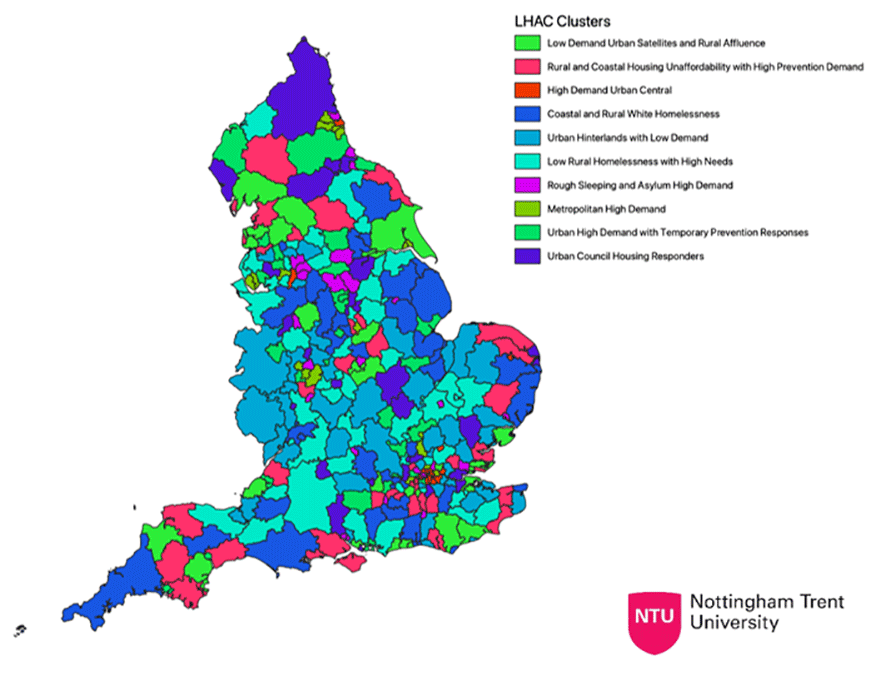Creating a way to identify localities that share similar housing and homeless characteristics
NTU's Local Homelessness Area Classification (LHAC) developed for housing and homelessness professionals
By Richard Pickford | Published on 24 January 2022
Categories: Nottingham Civic Exchange; Research; School of Social Sciences;

On Tuesday 18 January NCE supported colleagues at NTU shared a new way of connecting English Local Authorities based on 70 housing and homelessness metrics that has been designed to support shared learning and problem-solving. Through a mutual interest in homelessness, data and policy engagement the team, (Dr James Hunter, Dr Eva Zemandl, Richard Machin, Dr Ian Mahoney and Rich Pickford), worked to formulate a model that would help local authority practitioners and strategic leaders to identify similar authorities. Taking inspiration from the desire to understand the impact of the Homelessness Reduction Act upon local authority homelessness policies and practices, the team began exploring how they could in a small way help make a difference for those struggling to secure a home. The first version of the LHAC as we call it allows authorities to see who has similar homelessness and housing profile and to help them see how they compare against the data we have compiled.
Our aim is to deliver a policy tool that, via a statistical clustering process, divides all of England’s Local Authorities into 5 Super Groups and 10 Groups (mapped above). This enables the development of benchmarking, conversations, shared learning and improved practice between authorities and organisations focused on supporting people with housing needs across the country.
At a workshop hosted on Tuesday 18 January, we welcomed over 35 practitioners to critique the tool and to share where and how it could be developed. We were pleased to hear that they saw merit in the concept and the way we had developed it and most importantly they gave us a series of suggestions and ideas for enhancing it further. Our event explored participants understanding of similar authorities, shared the tool and then gathered insights and ideas from professionals working in this area.
As a team we will reflect on all the feedback we received during the session and explore how we share the full classification and a series of representative tools (pen portraits and radial plots) for each grouping in a more interactive manner. We are seeking additional funding and partners to work with us to better understand the way local authorities and their partners can connect across council boundaries within their cluster to share learning, overcome challenges and develop leading practices for homelessness and housing issues.
We believe this tool will provide the opportunity to ensure that lessons on tackling homelessness can be shared with the most relevant potential partners and seek your participation in follow up events to test our assumptions and build the LHAC into a shared resource across England (and beyond into the devolved administrations).
Please connect with us via email to talk about the LHAC, ask for a bespoke presentation or to offer your support to further develop the project. If you would like to become a partner for the development of the LHAC and support us to promote the tool with your own cluster we’d also love to hear from you. Please look out for further announcements via @NottsCivicEx for details of future events and project updates as they occur.
Nottingham Civic Exchange
Nottingham Civic Exchange has been established by Nottingham Trent University to maximise research, policy and practical impact by bringing together university expertise with partners seeking to address the needs of communities. Nottingham Civic Exchange acts as a resource to look at social and economic issues in new ways. This means facilitating debate, acting as a bridge between research and policy debates, and developing practical projects at a local, city and regional level.
Visit our website - www.ntu.ac.uk/nce Contact us - notts.civicex@ntu.ac.uk Follow us - @NottsCivicEx